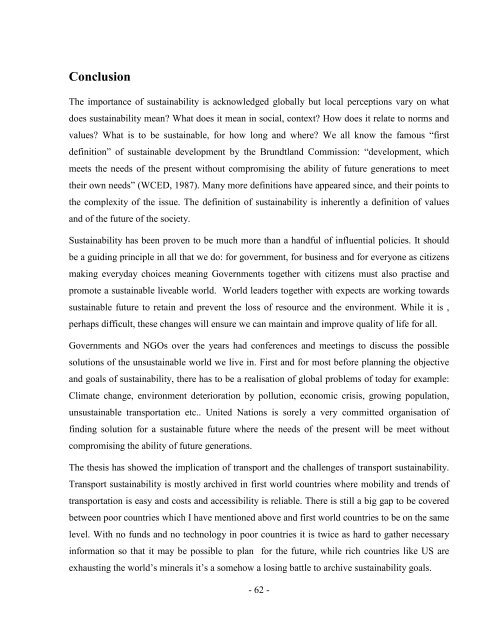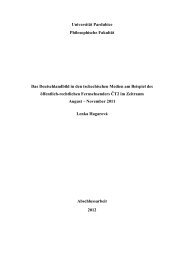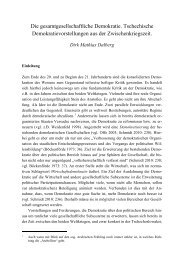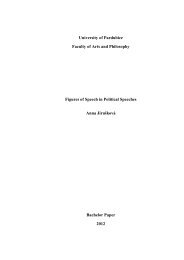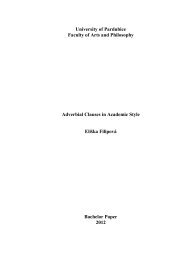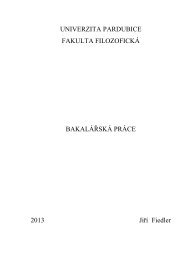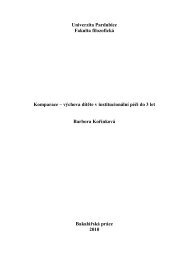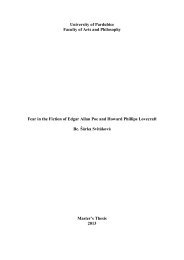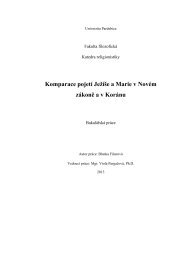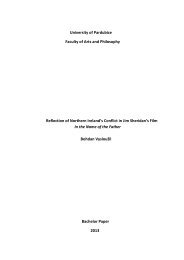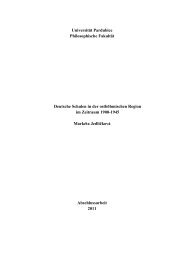University of Pardubice Jan Perner Transport Faculty Transport and ...
University of Pardubice Jan Perner Transport Faculty Transport and ...
University of Pardubice Jan Perner Transport Faculty Transport and ...
Create successful ePaper yourself
Turn your PDF publications into a flip-book with our unique Google optimized e-Paper software.
Conclusion<br />
The importance <strong>of</strong> sustainability is acknowledged globally but local perceptions vary on what<br />
does sustainability mean? What does it mean in social, context? How does it relate to norms <strong>and</strong><br />
values? What is to be sustainable, for how long <strong>and</strong> where? We all know the famous “first<br />
definition” <strong>of</strong> sustainable development by the Brundtl<strong>and</strong> Commission: “development, which<br />
meets the needs <strong>of</strong> the present without compromising the ability <strong>of</strong> future generations to meet<br />
their own needs” (WCED, 1987). Many more definitions have appeared since, <strong>and</strong> their points to<br />
the complexity <strong>of</strong> the issue. The definition <strong>of</strong> sustainability is inherently a definition <strong>of</strong> values<br />
<strong>and</strong> <strong>of</strong> the future <strong>of</strong> the society.<br />
Sustainability has been proven to be much more than a h<strong>and</strong>ful <strong>of</strong> influential policies. It should<br />
be a guiding principle in all that we do: for government, for business <strong>and</strong> for everyone as citizens<br />
making everyday choices meaning Governments together with citizens must also practise <strong>and</strong><br />
promote a sustainable liveable world. World leaders together with expects are working towards<br />
sustainable future to retain <strong>and</strong> prevent the loss <strong>of</strong> resource <strong>and</strong> the environment. While it is ,<br />
perhaps difficult, these changes will ensure we can maintain <strong>and</strong> improve quality <strong>of</strong> life for all.<br />
Governments <strong>and</strong> NGOs over the years had conferences <strong>and</strong> meetings to discuss the possible<br />
solutions <strong>of</strong> the unsustainable world we live in. First <strong>and</strong> for most before planning the objective<br />
<strong>and</strong> goals <strong>of</strong> sustainability, there has to be a realisation <strong>of</strong> global problems <strong>of</strong> today for example:<br />
Climate change, environment deterioration by pollution, economic crisis, growing population,<br />
unsustainable transportation etc.. United Nations is sorely a very committed organisation <strong>of</strong><br />
finding solution for a sustainable future where the needs <strong>of</strong> the present will be meet without<br />
compromising the ability <strong>of</strong> future generations.<br />
The thesis has showed the implication <strong>of</strong> transport <strong>and</strong> the challenges <strong>of</strong> transport sustainability.<br />
<strong>Transport</strong> sustainability is mostly archived in first world countries where mobility <strong>and</strong> trends <strong>of</strong><br />
transportation is easy <strong>and</strong> costs <strong>and</strong> accessibility is reliable. There is still a big gap to be covered<br />
between poor countries which I have mentioned above <strong>and</strong> first world countries to be on the same<br />
level. With no funds <strong>and</strong> no technology in poor countries it is twice as hard to gather necessary<br />
information so that it may be possible to plan for the future, while rich countries like US are<br />
exhausting the world’s minerals it’s a somehow a losing battle to archive sustainability goals.<br />
- 62 -


